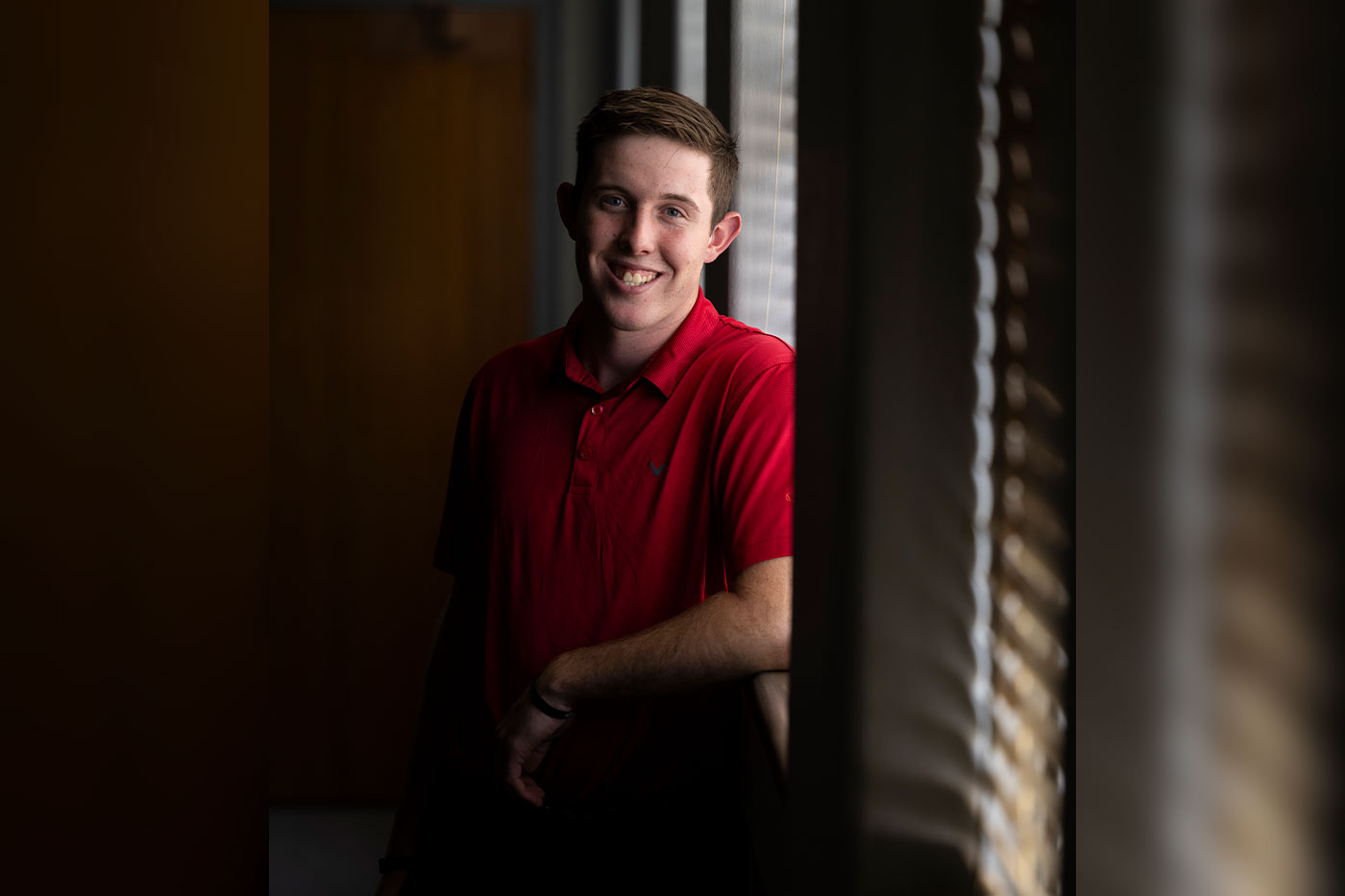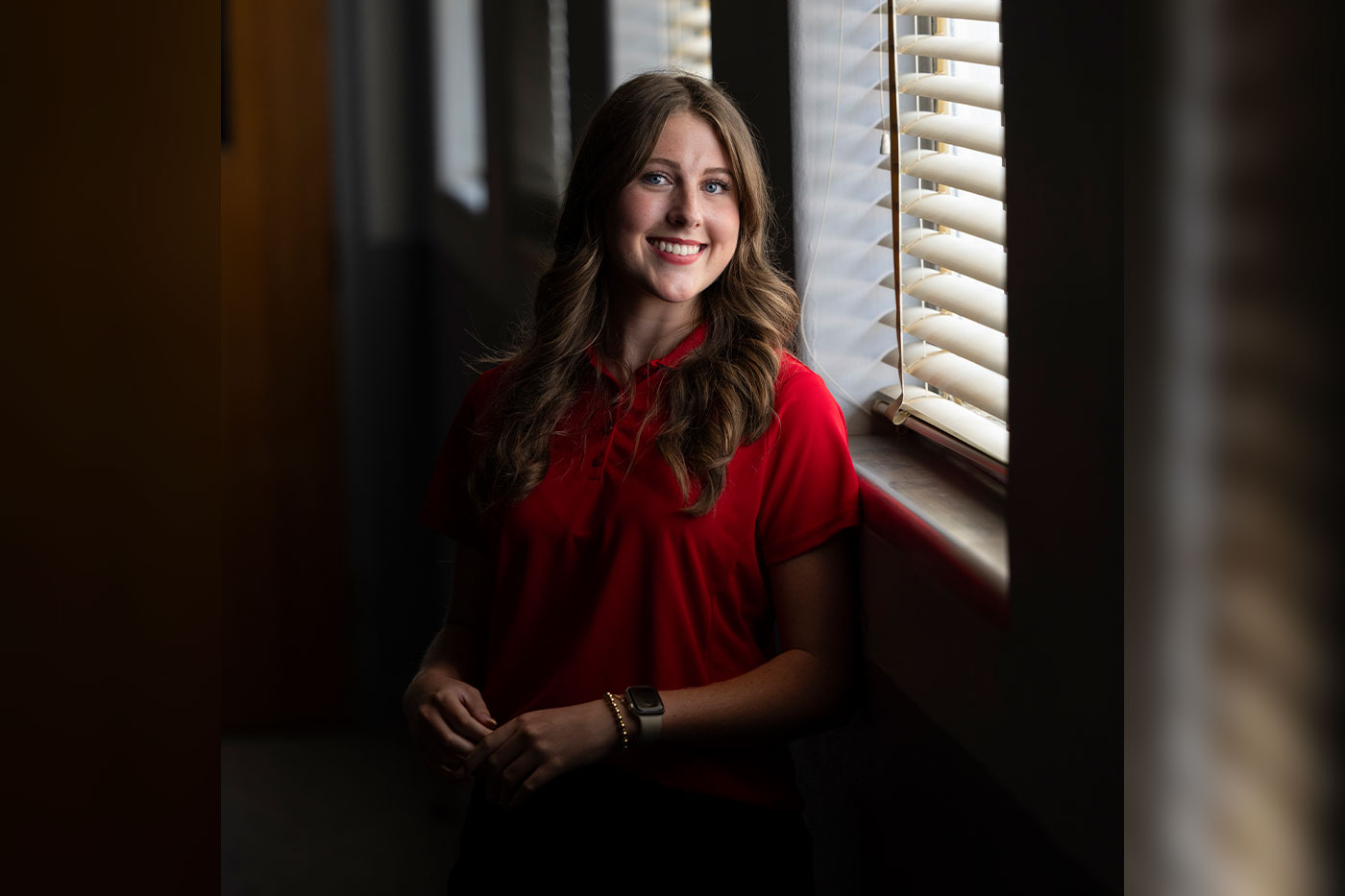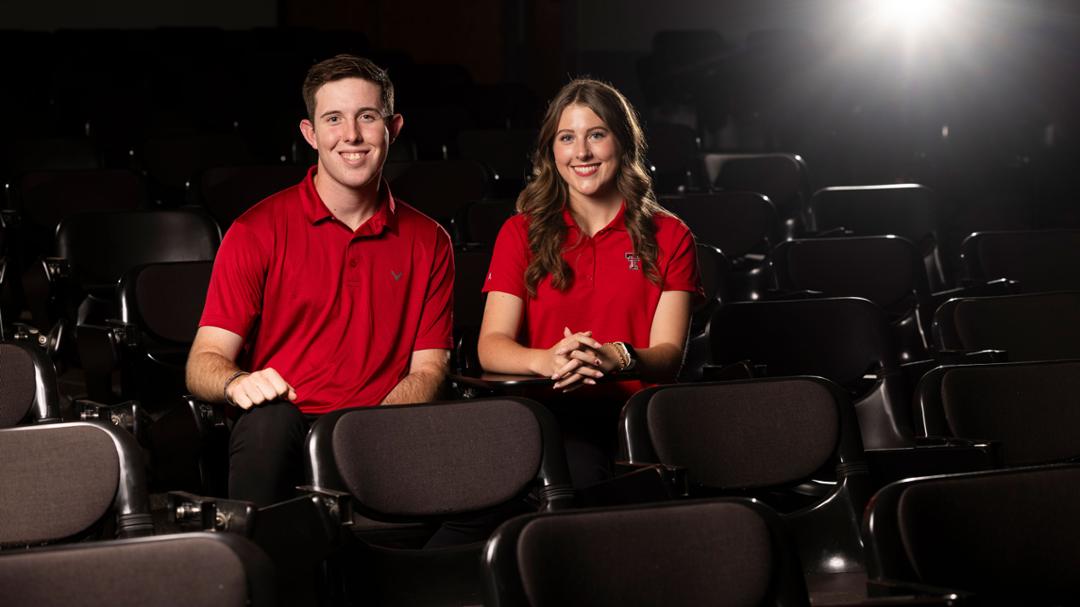A partnership between the Thoma Foundation and Texas Tech University has provided new possibilities for rural students.
For rural students, the path to college can be obstructed by barriers like technology gaps, proximity to higher education institutions and financial constraints.
However, what some might view as hindrances, others see as advantages that shape their resilience and perspective.
This is especially true for Cydnee Massey, a second-year creative writing student in the Department of English, and Wes Shaw, a second-year agriculture communications student in the Davis College of Agricultural Sciences & Natural Resources.
“Rural kids don’t always see their potential,” Massey said. “But I think we bring a fresh perspective to higher education. We’re taught to view hardship a little bit differently, and I think that’s one of our biggest strengths. We bring grit, and we know how to establish strong communities.”
Shaw agreed rural students bring something unique.
“Living in a rural area and living an agricultural lifestyle puts us at an advantage,” Shaw said. “We’re leaders and advocates for rural education and communities.”
Small-Town Kids, Big City Aspirations
Shaw was born and raised in McLean, Texas, a farming and ranching community with a population of 750, many of whom are members of families who have lived there for generations. He is a fifth-generation rancher who works on his family’s cattle ranch, which has been in operation since the late 1880s.

However, cattle ranching is only one aspect of Shaw’s identity. Over the years, he has excelled academically and competitively, serving as a state office for Texas 4-H, participating in his local FFA chapter and distinguishing himself in University Interscholastic League contests in poetry interpretation and congressional debate.
“My mom has always pushed me to do my best academically and in leadership positions,” Shaw said. “She’s always told me I was a small-town kid with big city aspirations.”
Across the state line, in Portales, New Mexico, Massey found herself in a parallel situation, but with similar dreams.
Massey was active in organizations like Family, Career and Community Leaders of America and Business Professionals of America while in high school. She also participated in varsity volleyball and golf.
Above all, Massey was committed to academics, enrolling in honors classes and competing in events like New Mexico’s Governor’s Southeast Regional STEM Challenge.
“I’ve always viewed myself in an academic sense,” she said. “I’ve always valued my education, and I’ve always wanted to go to college.”
A Legacy of Potential Realized
With college dreams in sight, Shaw and Massey submitted their respective applications to Texas Tech University and were accepted. Following their acceptance, they learned about scholarship options, including the Thoma Scholars Program.
Established in 2023 by Carl and Marilynn Thoma, the highly competitive program seeks students who not only demonstrate academic excellence and leadership skills but also possess the motivation and resilience to forge their own paths. These qualities stem from Carl and Marilynn’s personal experiences growing up in rural communities and the success they’ve achieved because of the traits they cultivated there.
The couple chose Texas Tech for their scholarship program because of the university’s longstanding commitment to rural students. Unlike institutions that serve rural areas from afar, Texas Tech is embedded at the heart of these communities, making it the ideal partnership.
“Texas Tech has been and always will be an advocate for rural communities and the students who come out of them,” said David Reyes, senior admissions counselor at Texas Tech and a Thoma Scholar recruiter. “Most universities in the metroplex couldn’t even point out Lubbock on a map, let alone the rural communities we serve. The Panhandle is under the radar.”
The Thoma Scholars Program offers up to $80,000 per full-time undergraduate student over four years, covering all costs associated with enrollment at Texas Tech—tuition, fees, housing, dining, books, supplies and even study abroad experiences.
Beyond financial support, Thoma Scholars receive comprehensive assistance from dedicated Texas Tech staff, including career-aspirations coaching, leadership development and access to academic support and counseling.
Determined to earn such an impactful scholarship, Massey and Shaw dedicated themselves fully to their applications, eager to stand out.
Shaw tried to approach his application more creatively than other applicants. He rewrote his essays about 20 times, sharing drafts with trusted teachers and school counselors to gather feedback.

Massey’s challenge with the application was the strict character limit. The first drafts of her essay questions far exceeded the 500-character limit, requiring her to spend significant time refining her responses.
The scholarship selection process was rigorous. Out of 342 applicants, only 46 were chosen for the interview round. However, according to Alejandra Padgett, the first Thoma Scholar lead student success specialist and a selection committee member, Shaw and Massey made a strong impression.
“We came to an easy consensus when selecting them,” Padgett said. “Wes had such a big personality that really shone through. Cydnee was more subtle in her confidence, but it was hard to miss her leadership.”
Massey and Shaw demonstrated authenticity and leadership as well as an eagerness to make a positive difference in the lives of others and their communities in their interviews.
“They were both humble but clear in letting us know who they were and the impact they wanted to make,” said Reyes, who was also on the scholarship selection committee. “They weren’t telling us what we wanted to hear, it was clear they were embodiments of rural leadership.”
Life-Changing Movements
Several weeks after her interview, Massey returned home from a golf tournament. Still in her uniform, she searched her house for her mom, who seemed to be missing despite her pickup truck in the driveway.
She made her way to her bedroom to put down her golf bag when she found her mom standing there, phone camera rolling and a box sitting on her dresser that read “Texas Tech University” in bold lettering across the top.
Confused, Massey asked her mom, “What are you doing?”
“She told me that I had received a package while I was gone for the tournament,” Massey recalled. “I was thinking, ‘Surely they wouldn’t send me something if I hadn’t received the scholarship?’”
With trembling hands, Massey picked up the box. It felt heavier than she expected, as if it carried the weight of the world. She held her breath as she carefully lifted the lid. Inside, the first item she came across was a letter addressed to her.
Her eyes quickly scanned the words, trying to make sense of what she was reading. Then it hit her; this was her acceptance letter into the Thoma Scholars Program. Tears of joy began to stream down her face, and weeks of uncertainty melted away.
“It was like a weight had been taken off my shoulders,” she said. “I was certainly surprised but mainly overwhelmed with gratitude.”
Meanwhile, three hours away at Clarendon High School, Shaw was experiencing his own life-changing moment. It began as a seemingly normal day until his iPhone started buzzing with notifications from his Life360 app. His dad was at his school, which was strange since their family ranch was a 40-minute drive away.
Shaw was puzzled but not alarmed. He assumed is dad had brought lunch for his mom, who works as a counselor at his school. Or maybe he was doing something nice for his sister whose birthday was coming up. He brushed off the notifications until he saw his mom walking towards him with urgency. Her expression carried an element of excitement that grabbed his attention.
“Wes, you need to go to the parking lot,” he recalled his mother saying to him.
With a mixture of confusion and anticipation, Shaw made his way to the parking lot, trying to make sense of what this could mean.
When he pushed open the doors that led to the parking lot, he found his dad standing there, tear-rimmed eyes and a big smile on his face. He was holding an already-opened box from Texas Tech.
“At first I thought it might have been another recruitment package,” he said, laughing. “But then I opened it up and the first thing I saw was ‘Thoma Scholars,’ and I started crying. I just didn’t expect it.”
The emotions expressed not just by Massey and Shaw, but also by their parents, show that the impact of the Thoma family’s generosity extends far beyond the 14 recipients selected for the program.
For these families, having one child’s education fully funded means parents can support their other children’s college aspirations without the burden of multiple tuition payments.
As for their communities, it’s validation of what they’ve always known. Rural students are successful, driven and certainly have a place in higher education.
“There’s a ripple effect in the Thoma family’s support that goes beyond the scholars,” said Lindsey Torres, the lead students success specialist for the Thoma Scholar Program. “Carl and Marilyn are not just supporting the students with this scholarship; they’re supporting their families and communities too.”
Building Community and Broadening Horizons
Upon arriving at the university, the 14 Thoma Scholars selected for the inaugural cohort immediately began seeking ways to grow more connected with one another and have a greater impact on those around them. This included establishing the Tech Thoma Scholars Student Organization.
While every student contributed to the organization’s development, Massey was ultimately elected president.
“Cydnee has a quiet leadership,” said Padgett, former lead student success specialist. “It’s a leadership that doesn’t take over others. She leads by example and figures out the best way to support her peers.”
With the organization established and supported by the Thoma Foundation through a budget for coordinating service projects and events, the group participated in Texas Tech’s Arbor Day tradition as their first service event.
“Creating this organization has brought us closer together, and I want people to see the impact we can make,” said Massey. “Each year we’ll have more scholars, we’ll have more opportunities, and that’s something that excites me.”
In addition to the time naturally spent together, the scholars’ connections have been nurtured through direct involvement from the Thoma Foundation. Carl and Marilynn have met with the students multiple times during their first year, sharing their vision for the program and hosting a celebration banquet with the scholars and their families in the spring of 2025.
Shaw was particularly struck by the Thoma family’s personal attention to his achievements throughout the year, as evidenced by Carl’s congratulation on his election to the student body senate. A little taken aback, Shaw was surprised Carl had even heard about it.
“I worked my tail off for that for four months,” he said. “It was nice that my hard work not only paid off but was noticed by Mr. Thoma.”
The Thoma family’s impact expands beyond validation for Massey and Shaw. The scholarship has given both students an opportunity to broaden their worldview, gain new experiences and offer clarity in their future careers.
For Massey, watching family members navigate the foster care system inspired her goal of becoming an ad litem lawyer. Her parents had always joked that she should pursue this career path because she was “good at arguing,” but at Texas Tech, she found the resources to turn that suggestion into a concrete reality.
For Shaw, his experiences have strengthened his resolve to be a voice for rural communities. Inspired by his debate background and upbringing in agriculture, he aspires to build a career in agricultural policy.
“My background in debate has inspired me to get into ag politics, either as a lawyer or lobbyist,” Shaw said. “Rural interests are shrinking every day. Only 2% of our population consists of farmers and ranchers. Someone needs to fight for that 2%, and I want to be that voice.”
Shaw and Massey are now looking ahead, committed to paying the Thoma family’s generosity forward by opening doors for not only the communities they seek to advocate for and represent in their future careers, but also the Thoma Scholars students who will come after them.
The Next Generation
The 2024-2025 Thoma Scholars cohort is already setting the standard for the 22 new students accepted for the 2025-2026 academic year. They continue to lead, inspire and give back, laying the foundation for the next group. They’re helping develop and implement a mentorship program to foster strong connections within the growing Thoma family, ensuring that each new group has the support system that helped them thrive.
“We’ve been given this amazing opportunity, and now our job is to continue to further our education,” Massey said. “I hope that we continue to show others what people from rural communities are capable of and show the Thoma family how grateful we are for them by giving back in that way.”
The Thoma Scholars’ story is just getting started. The first chapter shows that when rural students receive the support and recognition they need, their success has the potential to transform entire communities.
“I think back to when we first moved to campus, and how much we’ve grown as a group over the year and how different our lives would have been had it not been for the Thoma family’s support,” Massey continued. “I hope we can emulate the Thomas’ mission and leave a legacy of generosity that shows rural communities produce amazing people, too, and proves that small town doesn’t equal åsmall potential.”

